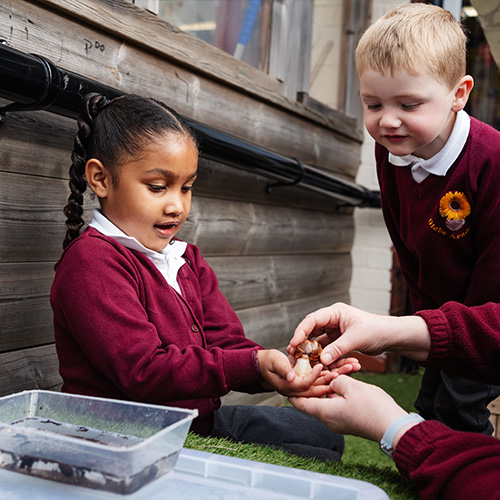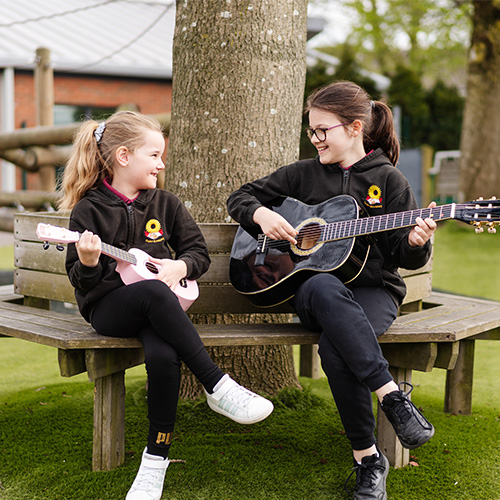Safeguarding
Keeping Your Child Safe
Staff and Governors are aware that many children are the victims of different kinds of abuse and that they can be subjected to social factors that have an adverse impact on their lives – including domestic violence, substance misuse, bullying, mental health and radicalisation. We also acknowledge that safeguarding incidents could happen anywhere and staff should be alert to possible concerns arising.
Through our curriculum, we teach children to stay safe and happy. We encourage the understanding that any problem or worry that they may have is legitimate, and to share their worries, big or small with their trusted adult; at home; school, or with ChildLine.

Early Help Offer

Family Support
Key Contacts
To contact us, please ring the school office on 01782 234868 and ask to speak to a member of the Safeguarding Team.
| Designated Safeguarding Lead | Mrs Fullwood |
| Deputy Designated Safeguarding Leads |
Mrs Suleman, Mrs Green, Mr Warrilow |
|
Safeguarding Governor |
Mr Jones |
| Chair of Governors | Mrs Price |
Safeguarding Overview
Child Protection Policy
- Lead designated person for Child Protection, and deputy
- Named Governor for Child Protection
- All staff have annual training for Child Protection Training
- All Designated Leads attend training biannually
- Governors have regular safeguarding training
- All staff have attended Prevent training
- Designated lead attends relevant training on specific issues, e,g DV, FGM, substance misuse
- First aid training (see medical needs)
- Clear procedures are in place to ensure that any suspicions about neglect or abuse are reported to the relevant agencies.
- Notes of concerns are raised and recorded on CPOMS as evidence of ongoing concerns
- Dedicated area on the school website for safeguarding and child protection
Safeguarding policies
- Child Protection
- Whistleblowing
- Intimate Care
- Dealing with Medical Needs in School
- Anti-Bullying
- Positive Behaviour
- Health and Safety
- PSHE, RSE, Drug Education
- Data Protection
- Management of Allegations against Staff
- Safer Recruitment
- Equality Statement
- SEND
- Positive Handling
- Code of Conduct for all Staff
- Teachers Standards
Inter-agency working – A relentless focus on joint working to secure positive outcomes for pupils
- Educational Psychology Service
- CAMHS
- Social Services
- Health Visitors and School Nursing Team
- NSPCC
- Counselling – New Era; Dove
- SENDS
- Speech and Language Therapists Occupational Therapists
- Information sharing with secondary schools
- Information sharing with previous settings
- Virtual School
- Operation Encompass
- Housing Officer Teams
- Benefit and Finance Teams
Safer Recruitment and Vetting
- All adults working with pupils in school have enhanced DBS checks. This includes any adult who comes into school on a regular basis
- Named Governors
- Regular Fire Risk Assessments
- Regular Fire Evacuation and
- Evacuation drills
- Clearly labeled exits
- Fire Safety Training completed by key members of staff
- Regular Health and Safety Checks are carried out
- Risk assessments are carried out for all offsite activities carried out in school
- Risk Assessments for pupils with medical needs completed.
- Safer recruitment training for SLT/Governors and procedures followed
Visitors
- All visitors report to the front desk to sign in electronically
- All visitors wear a sticker
- All visitors receive a safeguarding information leaflet to read
Volunteer
- Volunteer policy and application procedures in place
- All volunteers in regulated activity are DBS checked
- All volunteers not in regulated activity are supervised by a member of staff
- Safeguarding policy shared with volunteers
Behaviour
- Clear policy, based on choice, knowing self, and clear rewards and consequences
- Systems and reporting are followed by all members of staff.
- Half-termly monitoring, analysis and reporting
- Values-based ethos
- Mentoring
- Referral to other agencies
Attendance
- Admin team contact families of absent children
- Persistent absentees and lateness tracked by the attendance officer
- Attendance officer has regular meetings with VP
- Good attendance celebrated weekly for classes
- 100% attendance celebrated for individuals and at the end of year
Pastoral Support
- Family Support Coordinator in post
- Mentoring for pupils
- Social skills groups
- Lunchtime drop-in sessions for pupils
- Places at our breakfast and after school club for vulnerable pupils
- FSW signpost families to other agencies for support.
- Home visits for Nursery and Reception pupils pre-start
- Proactive approach through early help intervention
Medical Needs
- Clear policy in place
- All staff on site are trained in First Aid
- Four members of staff are trained in paediatric first aid
- Teaching/Teaching support staff trained in the management of anaphylaxis shock and asthma
- Five staff trained in the management of diabetes
Internet Safety
- E-Safety Policy
- E-Safety incident log
- E-Safety resources on website
- Parental permission for use of photographs/films on our school website/social media etc
- All pupils are taught how to keep themselves safe when using the internet
- Internet safety day
- Workshops offered to parents
- Acceptable use policy
- Internet filtering
- IT Network monitoring
Anti-Bullying
- Clear procedures for pupils to report bullying incidents
- ‘Anti-bullying day/week to supplement our PSHE curriculum to raise awareness
- Racist incidents are reported to the Governing Body
Curriculum
- PSHE
- Values-based education
- Playground friends/peer mediators
- ‘Keeping Safe’ assemblies, e.g. NSPCC, bullying, internet safety
- Relationship and Sex Education
- Drug education
- Road, Water, and Rail safety
- NSPCC ‘Pants’ campaign
- Prevent Education
Operation Encompass
Co-op Academy Glebe is part of the project that will run jointly between schools and Staffordshire Police. This is very successful project which has been rolled out across the country with a number of police forces and the schools within their area. Operation Encompass is the reporting to schools, prior to the start of the next school day, following an incident where a child or young person has experienced any domestic abuse.
How do the schools receive notification by the police that a domestic incident has occurred?
When an officer attends the incident and completes the risk assessment on their handheld device, the name(s) of the children who form part of the household (whether present on not) are included. Alongside the details of the child, the officer will select the school that the child attends from the dropdown list. By completing this section of the risk assessment, the officer generates an automatic referral to the school via an email in real time.
How does the notification help to support the child?
Children experiencing domestic abuse are negatively impacted by this exposure and this can lead to emotional, physical and psychological harm. By providing the school with the knowledge that a domestic incident has taken place in the child’s home the previous day, it allows the school to put support in place for the child should they need to before they arrive at school.
Operation Encompass will ensure that a member of the school staff, (Designated Safeguarding Lead) known as a Key Adult, is trained to allow them to liaise with the police and to use the information that has been shared, in confidence, while ensuring that the school is able to make provision for possible difficulties experienced by children, or their families, who have been experienced a domestic abuse incident. We are keen to offer the best support possible to all our pupils and we believe this will be extremely beneficial for all those involved.
Prevent Strategy
Prevent is a government strategy designed to stop people from becoming terrorists or supporting terrorist or extremist causes. Many of the things we do in school to help pupils become positive, happy members of society also contribute to the Prevent strategy.
Key Terms
Extremism ‐ vocal or active opposition to fundamental British values such as democracy, the rule of law and tolerance of different faiths and beliefs
Ideology ‐ a set of beliefs
Terrorism ‐ a violent action against people or property, designed to create fear and advance a political, religious or ideological cause
Radicalisation ‐ the process by which a person comes to support extremism and terrorism
What is the Prevent Strategy?
Prevent is a government strategy designed to stop people from becoming terrorists or supporting terrorist or extremist causes.
The Prevent strategy covers all types of terrorism and extremism, including the extreme right-wing, violent Islamist groups, and other causes.
How does the Prevent strategy apply to Co-op Academy?
From July 2015 all schools (as well as other organisations) have a duty to safeguard children from radicalisation and extremism. This means we have a responsibility to protect children from extremist and violent views the same way that we protect them from other causes of danger. Importantly, we provide a safe place for children to discuss these issues so they better understand how to protect themselves.
What does this mean in practice?
Many of the things that we already do in school to help children become positive, happy members of society also contribute to the Prevent strategy.
These include:
• Exploring other cultures and religions and promoting diversity
• Challenging prejudice and racist comments
• Developing critical thinking skills and a strong, positive self‐identity
• Promoting the spiritual, moral, social and cultural development of children, as well as British values such as democracy
We also protect children from the risk of radicalisation, for example by using filters on the internet to make sure that they can’t access extremist and terrorist material, or by vetting visitors who come to school to work with children.
Anti-bullying
Keeping safe from bullying is an integral part of our RSHE curriculum. Through our Values-based curriculum, pupils learn how to behave towards each other promoting the British values of tolerance and mutual respect. In our recent safeguarding review, pupils told us that bullying is extremely rare, and children spoke confidently about different types of bullying and what to do if they were being bullied. Children were able to distinguish between ad hoc name-calling and persistent bullying as a result of our teaching and approach to bullying.
NSPCC Pants campaign, keeping your child safe
ChildLine
E-safety
This is the safe use of the internet for gaming and communication. It included devices such as laptops, tablets, smartphones and games consoles. It is important that children and young people understand the benefits, risks and responsibilities of using and sharing information online.
Find out more here: internetmatters.org
